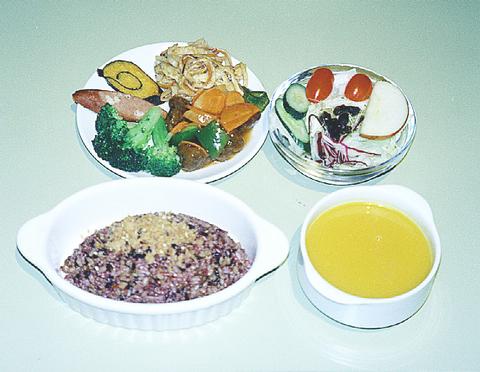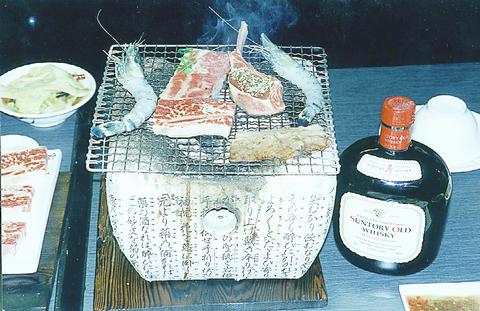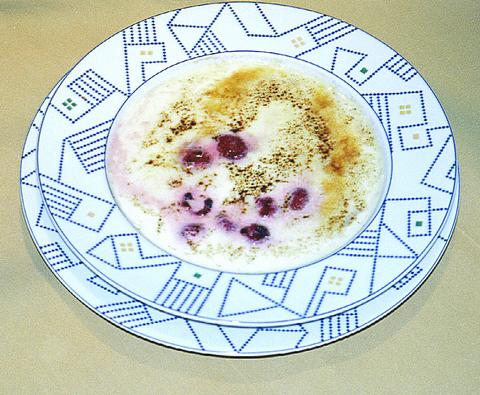Olive Tree
(Olive Tree 地中海式餐廳)
Imperial Inter-Continental Hotel Taipei, 2F, 600 Lin Shen N. Rd. (台北市林森北路600號台北華國洲際飯店二樓)

PHOTO: CHANG JU-PING
Tel: 25965111 ext. 2702
Open 11:45am-2:30pm; 6:00pm-10:30pm.
Average meal: NT$600. English menu. Credit cards accepted.

PHOTO: CHANG JU-PING
It may be premature to say that if the food looks good, it tastes good, but the dishes at this cozy restaurant, opened on April 25, look truly delicious. And best of all, the food measures up to its presentation, with a natural, non-greasy, and carefully-seasoned taste. In the short time it's been open, Olive Tree has become popular, particularly among female diners who shun overpriced "hotel restaurants."
Chef Tom Hsieh (謝宜榮), who has extensive experience at five-star hotels like Grand Hyatt Taipei and Grand Formosa Regent Taipei, says his catering includes authentic Mediterranean dishes. Hsieh does not try to produce overly sophisticated cuisine and people can make these typical Mediterranean dishes at home using the four cookbooks Hsieh has published.
The mezze buffet features over 25 dishes dishes. The cous-cous salad makes use of North African rice and zucchini prepared in Moroccan style. Hsieh also recommends the provencal potato salad. Other restaurants use mayonnaise in this dish but Hsieh opts instead for parsley, chicken and mustard to enhance the dish in a typical French style. Hsieh says his dishes are rarely found elsewhere, and usually are mixed with a variety of local and imported herbs. If the light dishes at the mezze buffet are not enough, there are also a la carte items with pasta, pizza and main courses to choose from. Seafood dishes are highly recommended. The chef in particularly thinks the Andalousian paella, with its succulent calamari, shrimps, and scallops, is a must try. The desserts are not to be overlooked, especially the raspberry creme brulee.

PHOTO: CHANG JU-PING
E2 Coffee
23, Ln. 240, Kuangfu S. Rd., Taipei(臺北市光復南路240巷23號地之華大廈).
Tel: 2776-3062
Open 7am to 11pm.
Average meal: NT$200. English menu. Credit cards not accepted.
Vegetarians looking for a nice spot to eat now finally have a place to accommodate them. E2 Coffee, opened six weeks ago, has large windows, a well-lit interior and healthy, organic food that makes this city diner wildly popular. Owner Chen Yao-tsung (
Chen emphasizes, however, that E2 is not strictly an organic food restaurant. Along with the organic rice and grains and vegetables are nine types of coffee and 10 types of herbal teas. For those who like a light and fragrant meal, try the cereal rice and vegetables Set. The rice bowl is furnished with a combination of mixed grains and different kinds of rice such as black sticky rice (黑糯米). Those who just can't do without the taste of meat should try the fish steak in Japanese style. The meat imitations are made from tofu and taste wonderful and don't have the fat. For extra pep, try the "miracle energy soup," a staple of most organic restaurants. It's a bit bitter, but is extremely healthy, and purports to restore one's energy. Chen says it is made of various kinds of fibers from vegetables, fruits and nuts. He also recommends finishing the drink within 15 minutes to maintain the freshness of the juice.
Chun-hsi Japanese Yakiniku Restaurant(春喜日式炭燒)
38 Peining Rd., Taipei (臺北市北寧路40號)
Tel: 2570-7793
Open 11:30am-2pm; 5pm-2am.
Average meal: NT$350. No English menu. Credit cards accepted.
Japanese-style barbecue is one of the novel ways of dining available at this chic, monochrome decor restaurant that opened April 1. Lawrence Lu (
Lu offers about 50 items for barbecue, including meat and vegetables. The various kinds of beef are a must try. Kobe is famous for its tender so-called "frost fall beef." There is also wu-hua beef, which has some fat in it for a richer taste. Lu also recommends French lamb chops. The three slices of tender meat are topped with Italian herbs for flavor enhancement. The sour and spicy cabbage is exceptional. An added attraction are several specials associated with the restaurant's grand opening -- buy-one-get-one-free Sapporo beer, free iced tea at noon and free soup all day.
-- chang ju-ping

April 14 to April 20 In March 1947, Sising Katadrepan urged the government to drop the “high mountain people” (高山族) designation for Indigenous Taiwanese and refer to them as “Taiwan people” (台灣族). He considered the term derogatory, arguing that it made them sound like animals. The Taiwan Provincial Government agreed to stop using the term, stating that Indigenous Taiwanese suffered all sorts of discrimination and oppression under the Japanese and were forced to live in the mountains as outsiders to society. Now, under the new regime, they would be seen as equals, thus they should be henceforth

Last week, the the National Immigration Agency (NIA) told the legislature that more than 10,000 naturalized Taiwanese citizens from the People’s Republic of China (PRC) risked having their citizenship revoked if they failed to provide proof that they had renounced their Chinese household registration within the next three months. Renunciation is required under the Act Governing Relations Between the People of the Taiwan Area and the Mainland Area (臺灣地區與大陸地區人民關係條例), as amended in 2004, though it was only a legal requirement after 2000. Prior to that, it had been only an administrative requirement since the Nationality Act (國籍法) was established in

Three big changes have transformed the landscape of Taiwan’s local patronage factions: Increasing Democratic Progressive Party (DPP) involvement, rising new factions and the Chinese Nationalist Party’s (KMT) significantly weakened control. GREEN FACTIONS It is said that “south of the Zhuoshui River (濁水溪), there is no blue-green divide,” meaning that from Yunlin County south there is no difference between KMT and DPP politicians. This is not always true, but there is more than a grain of truth to it. Traditionally, DPP factions are viewed as national entities, with their primary function to secure plum positions in the party and government. This is not unusual

US President Donald Trump’s bid to take back control of the Panama Canal has put his counterpart Jose Raul Mulino in a difficult position and revived fears in the Central American country that US military bases will return. After Trump vowed to reclaim the interoceanic waterway from Chinese influence, US Defense Secretary Pete Hegseth signed an agreement with the Mulino administration last week for the US to deploy troops in areas adjacent to the canal. For more than two decades, after handing over control of the strategically vital waterway to Panama in 1999 and dismantling the bases that protected it, Washington has